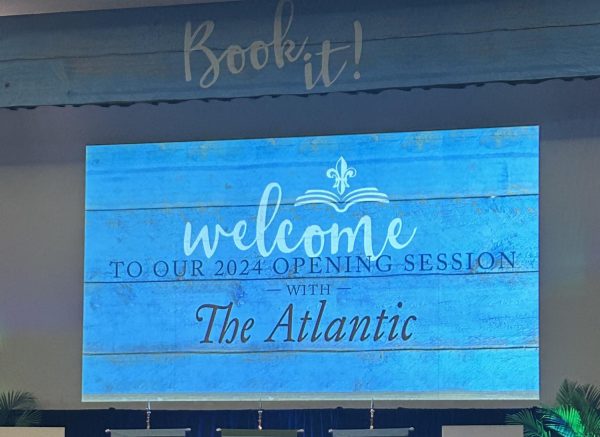
The third annual New Orleans Book Festival began Thursday at Tulane University.
A three-part panel opened the event: “The Atlantic Conversations,” “The Great American Novels” and “Open Minds: Protecting the Freedom to Read & Learn.”
The first panel, “The Atlantic Conversations,” featured The Atlantic’s editor-in-chief Jeffrey Goldberg and renowned author and Tulane professor, Walter Isaacson. The pair’s witty banter highlighted topics from The Atlantic’s list of the Great American Novels to technology’s role in spreading factual information.
The Atlantic also released a list of 136 “Great American Novels.” Goldberg said The Atlantic selected those books with the goal to spark conversation and reflect how literature has diversified in the past 40 years.
“The Atlantic has always tried to extend the idea of what an American writer is and could be,” Goldberg said. “The idea was to refine and illuminate the American idea.”
The conversation turned to politics, and Goldberg said The Atlantic is no stranger to showcasing conflicting ideas.
“You can’t illuminate and refine the American idea if you don’t have a bunch of competing ideas,” said Goldberg.
The magazine encourages a diversity of viewpoints, and Goldberg underscored the importance of truth in its publishing.
“One of the questions I frequently get is, will you run pro-Trump pieces? And the answer is yes, I would run pro-Trump pieces,” Goldberg said. “The issue is, every article that comes into our system has to go through fact checkers.”
“We are devoted to being a nonpartisan magazine,” Goldberg said. “Our objection to Trump is not because he is a Republican … it is, however, our standards for democracy, transparency, rule of law, free press, civil liberties and so on.”
Goldberg also discussed the role of technology in spreading truthful information and the importance of credible journalism.
“We have a generation of teenagers and young people getting their information and learning from TikTok University,” Goldberg said. “The reason that people still read serious newspapers and magazines is because someone at those places is doing the work of disaggregating reality from fantasy.”
Goldberg concluded the panel by reiterating the magazine’s values of truthful and conversation-starting journalism.
“Part of the genius of America is that the goal, our common goal, is to make it a more perfect union. We’ll never get to perfection just as a human endeavor,” Goldberg said, “but the only way you can get to something approaching perfection is to actually talk honestly about the imperfections.”
The Atlantic reporters also discussed the novels. Journalist Jemele Hill moderated a panel featuring writers Jane Kim, Ellen Cushing and Clint Smith. The four dove deep into the decisions behind the 136 Great American novels.
When asked what makes a Great American novel, all responses explored what it means to be alive in America. The Atlantic picked each novel because its themes and ideas were diverse and because it spoke to the diversity of Americans.
“We picked novels that could paint the soul of America,” Cushing said.
The Atlantic had no specific number of books in mind when it created the list, and the magazine stopped when the list felt complete. The number of books, 136, is as random as it seems.
The discussion shifted to the rise of book banning in the United States, which has spiked 33% in the past year. Since the novels on the list are diverse in nature, many have ended up on lists of banned books. 44% of the novels are banned in some capacity.
However, Crushing, Kim and Smith argued that despite being banned, the books shed light on fundamental human experiences and deserve to be read.
The first day of Book Fest concluded with “Open Minds: Protecting the Freedom to Read and Learn” with acclaimed author and Tulane professor Jesmyn Ward and moderator Hill.
Ward’s book “Salvage the Bones” appears on both the banned and the Great American Novels lists.
Ward said her inspiration comes from her family and the libraries she attended as a child. Drawing upon her experiences growing up in poverty in DeLisle, Mississippi and enduring Hurricane Katrina, she hopes to shed light on stories like hers that may not always be told.
“I feel a responsibility to tell our stories because I feel like we have not been present in the landscape of literature,” Ward said.
Empathy, Ward said, is especially needed at a time when countless books are being banned every year.
“I try to make my characters as complicated and as complex as I can so that the reader feels as if they are living this experience with the person,” Ward said. “My hope is to make the reader, through that experience, feel empathy.”
Ward ended on a hopeful note, and said that book banning won’t stop stories from being diverse.
“I think that we will come out of this moment,” she said, “because so many people are pushing back: writers, librarians, book lovers, critics, so many people are pushing back against this erasure.”




Leave a Comment